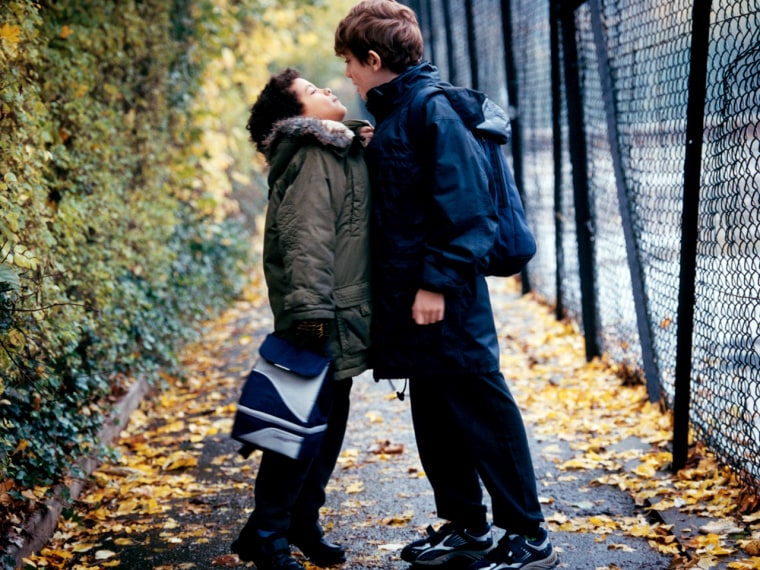On a recent morning, Heli Wiener had a minor crisis on her hands. Her 3-year-old daughter was playing with an old cell phone and her 5-year-old son wanted it all for himself.
“He was getting in her face about it, so she was hitting him because she wanted him to leave her alone,” Wiener, of Deerfield, Ill., told TODAY Moms.
“My daughter is extremely sweet and kind (but) she developed some of those bad habits of teasing and hitting because she sees it works for him,” Wiener says.

The story of siblings not getting along is as old as Cain and Abel, but there’s real reason to worry when the kid hostility goes too far. Research published Monday found that being picked on by a brother or sister can be harmful to a child’s mental health.
Michele Borba, a parenting expert and TODAY contributor, travels around the country to educate parents about bullying and whenever the subject of sibling intimidation comes up, there’s a visible reaction.
“You see nodding, you see concern,” Borba says. “It’s clearly an issue.”
Many parents have been told to stay out of routine kid squabbles so the children can work out their conflicts by themselves and Borba agrees with that approach. Wiener, who writes the Mommy’s Two Cents blog, follows it as well.
“When we’re removed from it, there seem to be closer and more tender moments shared, but when we’re involved, frequently their interaction is tattling, fighting, and arguing,” she said.
But moms and dads shouldn’t ignore bullying, which is different from teasing and goes beyond normal sibling fighting or rivalry, Borba said.
She advises parents to look for the three classic signs of bullying: an imbalance of power, where one child cannot stand up to the other kid because of size, age or other factors; intentional cruelty, and mistreatment that keeps repeating, rather than being a one-time offense.
“It’s not fun-loving teasing and ribbing like siblings or best friends do. It’s intended to hurt physically or emotionally,” said Amy McCready, a TODAY Moms contributor and author of the parenting guide, “If I Have to Tell You One More Time.”
McCready says parents should intervene when the siblings are clearly beyond their means to work things out.
So what should you do if you are worried that one of your kids is mistreating another? Here are tips from the experts:
The hard part is recognizing that there is bullying going on. Once you pick up on it, your next step might be to seek advice from the child’s teacher or school counselor, Borba said. Be sure to ask whether the same behavior is happening in the classroom since bullying at home can spill over to tormenting other kids, she added.
Recognize that you may unknowingly be contributing to the problem. Some parents foster a victim-and-aggressor mentality between the siblings, with one child getting a lot of attention for being picked on and the other learning that there is a lot of power in being the bully, McCready noted.
Teach the bullied child powerful words. McCready said they might be phrases like “stop now!” Remind your child he or she can leave, get help and doesn’t have to be the victim, she advised. Meanwhile, the tormentor should have to make it right with an act of kindness, not just an obligatory, “I’m sorry.” Cleaning the other child’s room, for example, might be an appropriate gesture.
Figure out what’s motivating the bully. Some reasons might be impulsivity, jealousy of a sibling who is getting more attention, inability to solve problems or low empathy, Borba said. The best way to boost empathy is to witness it, so it may benefit the bully to do some sort of service for others, she added.
Let them vent in a constructive way. If a child is exerting power in negative ways, look for opportunities to help him feel powerful in a more positive setting, McCready advised. That might mean enrolling him in a sports program or getting him involved in family decisions, as appropriate.
Realize that most sibling rivalry is about sharing. To solve “it’s-my-turn” arguments, Borba suggested using a simple sand timer or oven timer that would give each child a set amount of time to play a video game or be in charge of the remote control, for example.
Employ conflict resolution strategies. Whenever possible, let the kids come up with a resolution they can both get on board with, McCready said. When her two sons fought over who had to empty the dishwasher each night, they decided to use an odd/even system based on the date on the calendar.
"The more you can put the responsibility in their hands to come up with a solution, the more they’re going to buy into it and the more invested they’re going to be," she said.